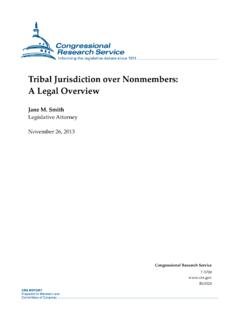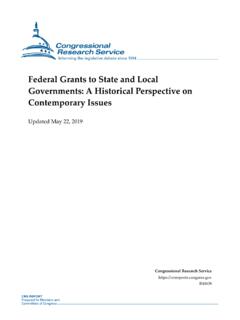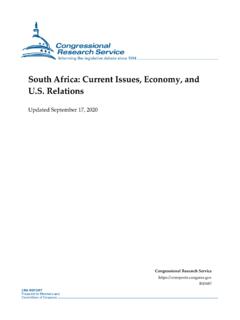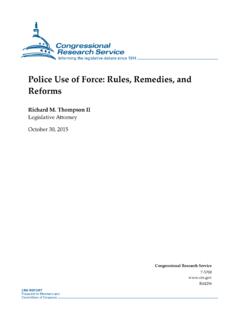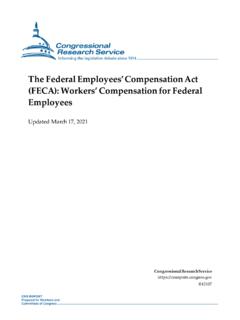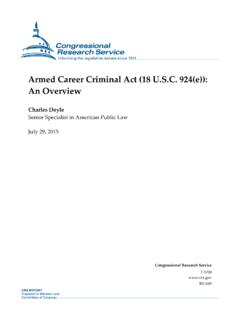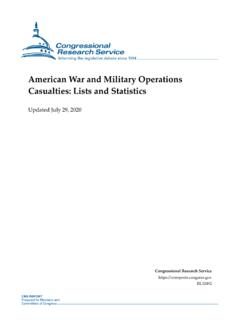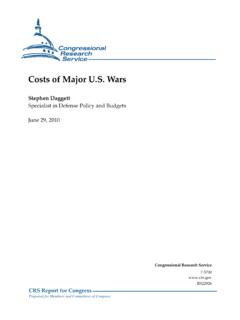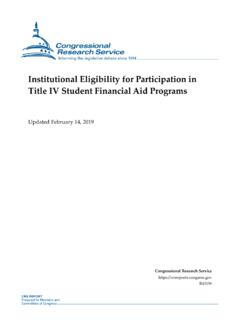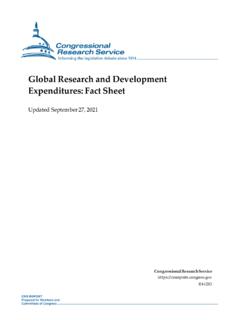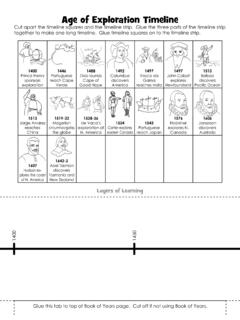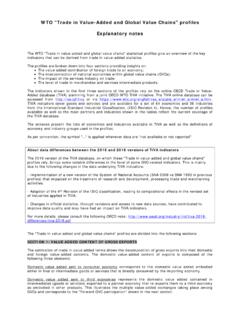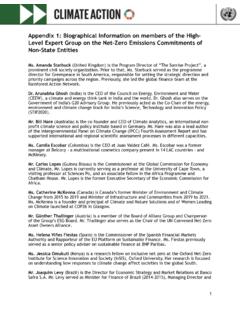Transcription of The Organization for Economic Cooperation and Development
1 The Organization for Economic Cooperation and Development James K. Jackson Specialist in International Trade and Finance October 30, 2013. Congressional Research Service 7-5700. RS21128. The Organization for Economic Cooperation and Development Summary The Organization for Economic Cooperation and Development (OECD) celebrated its 50th anniversary in 2011, a time when the global economy was struggling to recover from the financial crisis and slow Economic growth. The OECD is an intergovernmental Economic Organization in which the 34 member countries discuss and develop key policy recommendations that often serve as the basis for international standards and practices. In addition, the OECD members analyze Economic and social policy and share expertise and exchanges with more than 70 developing and emerging economies. The 34 member countries include Australia, Austria, Belgium, Canada, Chile, the Czech Republic, Denmark, Estonia, Finland, France, Germany, Greece, Hungary, Iceland, Ireland, Israel, Italy, Japan, Korea, Luxembourg, Mexico, The Netherlands, New Zealand, Norway, Poland, Portugal, Slovak Republic, Slovenia, Spain, Sweden, Switzerland, Turkey, United Kingdom, and the United States.
2 While all of the member countries are considered to be economically advanced and collectively produce 60% of the world's goods and services, membership is limited only by a country's commitment to a market economy and a pluralistic democracy. The OECD also has extended an invitation to the Russian Federation for membership, which includes meeting rigorous best practices relative to anti-bribery and anti-corruption standards. Furthermore, the OECD works with other potential partners such as Brazil, China, India, Indonesia, and South Africa with a view toward possible membership. The member countries rely on the OECD Secretariat in Paris to collect data; monitor trends;. analyze and forecast Economic developments; and research social changes and patterns in trade, environment, agriculture, society, innovation, corporate and public governance, taxation, sustainable Development , and other areas to inform their discussions and to assist them in pursuing their efforts to develop common policies and practices.
3 Following the financial crisis, the OECD played a major role in providing cross-country analyses of market reforms and programs to stimulate growth. The United States has sparred periodically with other OECD. member countries over various issues, including antidumping laws and the size of the financial contribution. Karen Kornbluh was appointed in 2009 by President Obama to serve as the Ambassador to the OECD. She stepped down as Ambassador and Daniel W. Yohannes was nominated to serve as the next Ambassador to the OECD. Key issues for Congress include OECD work on coordinating national approaches to curtailing bribery and the illicit use of tax havens. Congress appropriated about $ million to the OECD in FY2013; the budget request for FY2014 was $ million. Congressional Research Service The Organization for Economic Cooperation and Development Contents Background .. 1. OECD Issues .. 3. OECD and the Financial and Economic Crises .. 5. OECD and the 7. Tax Havens, Anti-Corruption, and the OECD.
4 8. Base Erosion and Profit Shifting .. 10. Issues for Congress .. 12. Contacts Author Contact 15. Congressional Research Service The Organization for Economic Cooperation and Development Background The United States, along with a number of European countries, formed the predecessor Organization to the OECD, the Organization for European Economic Cooperation (OEEC), in order to administer aid under the Marshall Plan for the reconstruction of Europe after World War II. In 1961, the OECD was formed to take over from the OEEC with a mandate to build strong economies in its member countries, improve efficiency, hone market systems, expand free trade, and contribute to Development in industrialized as well as developing countries. In 2011, the OECD celebrated its 50th anniversary. The 34 member countries of the OECD decided to broaden the OECD beyond its roots as a transatlantic Organization into a global network of nations that focus their efforts on assisting developing and newly emerging economies that adopt free market systems.
5 As a result of this broader perspective, the OECD has shifted its emphasis from focusing exclusively on the members of the OECD to assessing the manner in which various policy issues affect a broad range of countries, including the impact globalization is having on world trade, wages, and industrial Development . The OECD is organized around three main bodies: the Council, the Committees, and the Secretariat. Committees are comprised of representatives of all the member countries. The overriding committee is the Council, which has decision-making power. It is composed of one representative for each member country, generally at the level of Ambassador; gives guidance to the OECD; and directs its work. Since the work agenda is set by unanimous consent by the Council, a veto by a Council member removes an item from the agenda. The Council meets at the ministerial level once a year, when foreign, finance, and other ministers from member countries raise issues and set the priorities for OECD work for the coming year.
6 About 200 committees, comprised of some 40,000 senior government officials from the member countries and representatives from the private sector and labor, meet to review and contribute to work that is conducted by the Secretariat. In many cases, these committees serve as conduits for providing information on work that is being conducted by officials among the OECD member countries on Economic issues. The Council also determines the OECD's budget, which presently amounts to about 354 million, or about $460 million ( = $ ). The OECD's budget is comprised of shared expenses, public sales of publications, assessments of all the members based on the relative size of their economies, and voluntary contributions (not a part of the official budget). The United States, which appropriated about $ million in FY2012 (the Administration has asked Congress to appropriate $ million in FY2014), contributed of the OECD's The share of the budget is expected to decline to in 2018 as a result of financing reforms.
7 In addition, the OECD undertakes special projects and research at the request of and on behalf of a smaller number of OECD members and other non-OECD members, who fund those projects separately. The Secretariat is comprised of a staff of about 2,500, mostly economists, scientists, lawyers, and other professionals, who are organized into directorates to support the work of the Committees to deliver the work program approved by the Council. As a result, the Secretariat is organized along 1. Function 105 & Other International Programs, Fiscal Year 2014, Executive Budget Summary, Department of State, p. 46. Available at Congressional Research Service 1. The Organization for Economic Cooperation and Development substantive areas to mirror the work of the Committees, although the structure is flexible enough to handle cross-disciplinary studies. There are 13 directorates that focus their work in such areas as employment and labor; environment and economics; trade and investment; biotechnology, agriculture, science and technology, internet, tax and anti-bribery standards, gender, green growth; public management; and globalization and Development .
8 One directorate collects data, monitors trends, and analyzes and forecasts Economic developments, while other directorates research social changes or evolving patterns in trade, environment, agriculture, technology, taxation, and more. In addition to standard statistics that provide quantitative measures of Economic Development , the OECD has developed a better life initiative through which it is attempting to assess more broadly the quality of life and policies that can enhance living conditions of people and households and improve well-being. The OECD produces (1) semi-annual Economic outlook reports that analyze Economic conditions generally and provide forecasts of Economic growth in member countries; (2) comprehensive reports on the individual members of the OECD; and (3) a vast amount of statistical information and data on the member countries that are made comparable to facilitate comparison and analysis regarding best policies and practices. These data include national accounts, Economic indicators, labor force and employment, migration, education, energy, taxation, tourism, and environment.
9 The OECD also initiated and coordinates the work of the International Collaborative Initiative on Trade and Employment (ICITE), a group of 10 organizations with the stated goal of improving understanding of the impact of international trade on labor. The ICITE project has attempted to improve the knowledge base of trade and labor through empirical analysis, publications, and conferences. In 2012, the group published Policy Priorities for International Trade and Jobs, a compilation of 14 separate studies, ranging from trade, wages, and employment to trade and services, trade and working conditions, and regional trade Similar coordination takes place regarding the Internet as part of the Information and Communication Technology Policy Committee. In the 1990s, the OECD, under the direction of its member countries, including the United States, spearheaded an international agreement to outlaw crimes of bribery, and it continues to coordinate efforts that are aimed at reducing the occurrence of money laundering and corruption.
10 Also, the OECD is a pivotal player in promoting corporate codes of conduct that attempt to develop a voluntary set of standards for multinational firms that can be applied across national borders. The OECD is also analyzing the role of state-owned enterprises in the world economy, and it is spearheading the Development of potential international standards on the Internet. In 2011, the OECD members adopted an updated version of the OECD Guidelines for Multinational Enterprises that (1) includes a new chapter on human rights that is consistent with the United Nations' Guiding Principles on Business and Human Rights; (2) provides a new and comprehensive approach to due diligence and responsible supply chain management; (3) makes changes to such chapters as combating bribery, employment and industrial relations , bribe solicitation and extortion, environment, consumer interests, and disclosure and taxation; and (4). provides clearer and reinforced procedural guidance to strengthen the role of the National Contact Points, who hear complaints in each 2.
